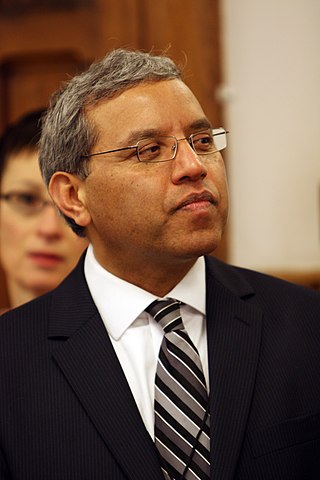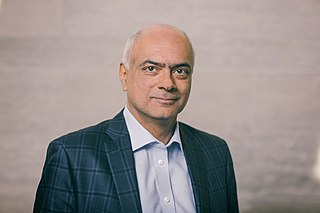Related Research Articles
A trade bloc is a type of intergovernmental agreement, often part of a regional intergovernmental organization, where barriers to trade are reduced or eliminated among the participating states.
Global governance refers to institutions that coordinate the behavior of transnational actors, facilitate cooperation, resolve disputes, and alleviate collective action problems. Global governance broadly entails making, monitoring, and enforcing rules. Within global governance, a variety of types of actors – not just states – exercise power.

Giovanni Arrighi was an Italian economist, sociologist and world-systems analyst, from 1998 a Professor of Sociology at Johns Hopkins University. His work has been translated into over fifteen languages.

Gary P. Sampson is professor of international trade at Melbourne Business School (MBS), Melbourne University, Australia.
Timothy J. Dunne is a British scholar of international relations, currently serving as Provost and Senior Vice-President at the University of Surrey. He is also an Emeritus Professor at the University of Queensland, where he was previously Deputy Provost and Dean of Humanities and Social Sciences.

Jennifer Sterling-Folker is a Professor of Political Science at the University of Connecticut. She was the Alan R. Bennett Honors Professor of Political Science. She is a specialist in International Relations theory.

Gregory Shaffer is the Scott K. Ginsburg Professor of International Law at the Georgetown University Law Center. From 2022-2024 he served as President of the American Society of International Law. He is known for his work on international law, with a specialization on international trade law, and law and globalization.
Daniel Drache is a scholar in Canadian and international political economy, globalization studies, communication studies, and cultural studies. He is recognized as having made important contributions to comparative and interdisciplinary debates on policy, globalization, border security, and the impact of new information and communication technologies on political mobilization and citizenship. He is also known for his critique of market fundamentalism. In Canada he is also credited with reviving the work of foundational political economist Harold Innis within the academy. Drache is a professor emeritus political science and senior research scholar of the Robarts Centre for Canadian Studies at York University in Toronto, Canada.
Shirin M. Rai, is an interdisciplinary scholar who works across the political science and international relations boundaries. She is known for her research on the intersections between international political economy, globalisation, post-colonial governance, institutions and processes of democratisation and gender regimes. She was a professor of politics and international studies at the University of Warwick, and is the founding director of Warwick Interdisciplinary Research Centre for International Development (WICID).

Surya Prasad Subedi OBE KC DCL is a British-Nepalese jurist. He is Professor of International Law at the University of Leeds, a member of the Institut de Droit International, and a barrister in London. He also is a visiting professor on the international human rights law programme of the University of Oxford. He served as the United Nations special rapporteur for human rights in Cambodia for six years (2009-2015). He also served for five years, starting in 2010, on an advisory group on human rights to the British Foreign Secretary. In 2021, he was appointed legal procedural advisor to the World Conservation Congress of the International Union for Conservation of Nature held in Marseille, France. He has written a number of works on the theory and practice of international law and human rights and acted as a counsel in a number of cases before the international courts and tribunals, including the International Court of Justice. In 2022, he was appointed to the list of arbitrators under a post-Brexit free-trade treaty between the United Kingdom and the European Union - the Trade and Cooperation Agreement (TCA).
J. Richard Peet is a retired professor of human geography at the Graduate School of Geography at Clark University in Worcester MA, USA. Peet received a BSc (Economics) from the London School of Economics, an M.A. from the University of British Columbia, and moved to the USA in the mid-1960s to complete a PhD in Geography from the University of California, Berkeley. He began teaching at Clark University shortly after completing his PhD from Berkeley, remained there for over 50 years, with secondments in Australia, Sweden and New Zealand. He was 'forced' into retirement in 2019, when 79 years old.
China became a member of the World Trade Organization (WTO) on 11 December 2001, after the agreement of the Ministerial Conference. The admission was preceded by a lengthy process of negotiations and required significant changes to the Chinese economy. Its membership has been contentious, with substantial economic and political effects on other countries and controversies over the mismatch between the WTO framework and China's economic model. Assessing and enforcing compliance has become issues in China-US trade relations, including how China's noncompliance creates benefits for its own economy.

Thomas G. Weiss is a distinguished international diplomat and scholar of international relations and global governance with special expertise in the politics of the United Nations, where he himself served in various high-ranking roles. He was named a 2016 Andrew Carnegie Fellow for a project exploring the concept of a world without the United Nations. Since 1998, he has been Presidential Professor at the Graduate Center of the City University of New York, and is Director Emeritus of the Ralph Bunche Institute for International Studies. At present, he also is co-chair, Cultural Heritage at Risk Project, J. Paul Getty Trust; Distinguished Fellow, Global Governance, The Chicago Council on Global Affairs; Global Eminence Scholar, Kyung Hee University, Seoul. In his spare time, he is a wood sculptor.

Brigitte Young, is Professor Emeritus of International political economy at the Institute of Political Science, University of Münster, Germany. Her research areas include economic globalization, global governance, feminist economics, international trade, global financial market governance and monetary policy. She has worked on EU-US financial regulatory frameworks, European economic and monetary integration and heterodox economic theories. She is the author of many journal articles and books in English and German on the Global financial crisis of 2008–2009, the US Subprime mortgage crisis, the European sovereign-debt crisis, and the role of Germany and France in resolving the Euro crisis.

David Hulme is Professor of Development Studies at The University of Manchester where he is Executive Director of the Global Development Institute and CEO of the Effective States and Inclusive Development Research Centre. Currently, he is the president of the Development Studies Association. He has worked on rural development, poverty and poverty reduction, microfinance, the role of non-government organisations in development, environmental management, social protection and the political economy of global poverty for more than 30 years. His main focus has been on Bangladesh but he has worked extensively across South Asia, East Africa and the Pacific. Recently, he has been a leading international expert in the discussion of the Millennium Development Goals and the Post-2015 Development Agenda.
Rodney Bruce Hall is an American Professor of International Relations and among those scholars known as Second Generation Constructivists. He earned bachelor's and master's degrees in physics and subsequently a master's degree in international relations and a PhD in political science from the University of Pennsylvania under the supervision of Friedrich Kratochwil, one of the founding scholars of constructivism in international relations.
Chantal J.M. Thomas, Cornell Law Professor at Cornell Law School, directs the Clarke Initiative for Law and Development in the Middle East and North Africa. She teaches in the areas of Law and Development, Law and Globalization, and International Economic Law. She is active in the areas of human rights and social justice, particularly in the Middle East.

Stuart Edward Corbridge, FRGS is a British geographer and academic specialising in geopolitics, development studies, and India. From September 2015 to July 2021, he was Vice-Chancellor and Warden of Durham University. From 2013 to 2015, he was Provost and Deputy Director of the London School of Economics. He was also Professor of Development Studies at LSE.

Rohinton P. Medhora is a Canadian economist. His fields of expertise are monetary and trade policy, international economic relations, and development economics. He is a Centre for International Governance Innovation (CIGI) distinguished fellow, former president of CIGI and professor of practice at McGill University's Institute for the Study of International Development.
Jeffrey Harrod is a writer and essayist on politics and international political economy and known for his work on the power of corporations and the position of labour in international economic relations. He has been critical of global approaches which reduce the importance of nation-states. Working with Robert W. Cox a power dynamics approach to the political economy of work was developed. Harrod's application of this approach to those in low-waged or precarious employment is currently used by researchers in those fields. Since 2012 he has maintained a blog and in 2016 published his first novel, After Man.
References
- ↑ "People and Contacts « UK Trade Policy Observatory".
- ↑ Wilkinson, Rorden (1997). Multilateralism and the World Trade Organisation: The Practice of Regulating International Trade (Doctoral thesis). ResearchSpace@Auckland, University of Auckland. hdl:2292/950.
- ↑ "Public lecture by Professor Rorden Wilkinson from the University of Manchester, UK – King's University College". King's Western University Canada . Retrieved 5 June 2014.
- ↑ Shah, Vikas (1 January 2014). "Equality | Thought Economics". Thoughteconomics.blogspot.co.uk. Retrieved 5 June 2014.
- ↑ "Routledge series on Global Institutions".
- ↑ "Global Governance Editorial Board". Lynne Rienner Publishers. Retrieved 5 June 2014.
- ↑ Joel Davis posted on (21 March 2014). "SWIPE Committee Announces Recipient of 2014 Mentor Award > International Studies Association". Isanet.org. Retrieved 5 June 2014.